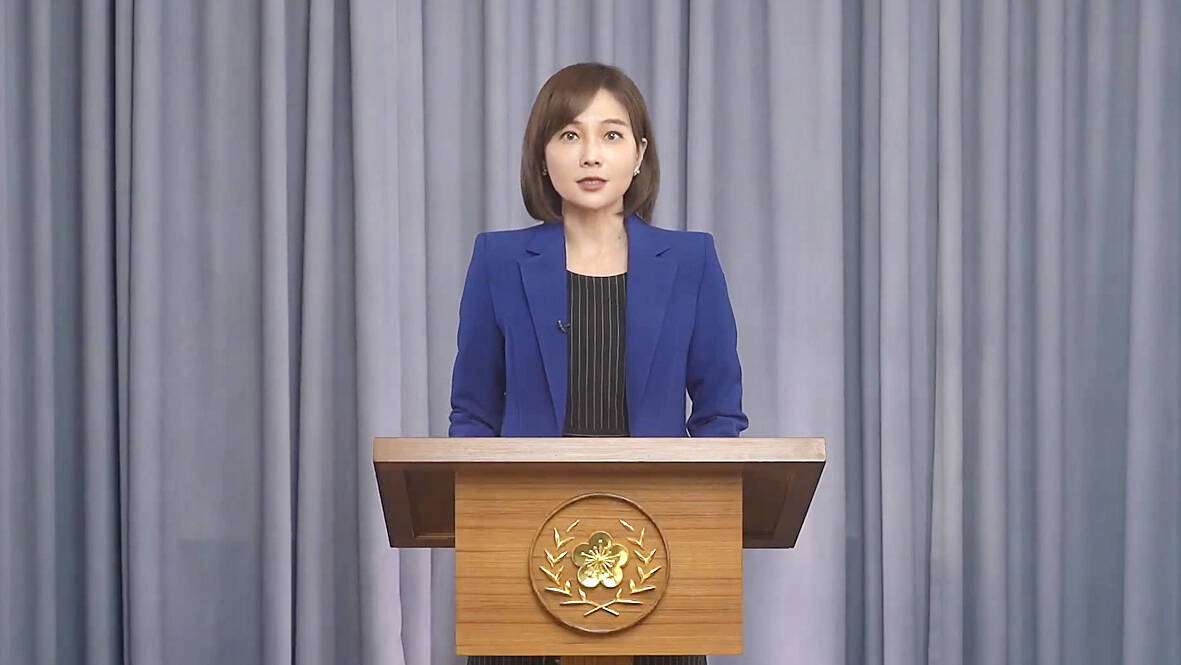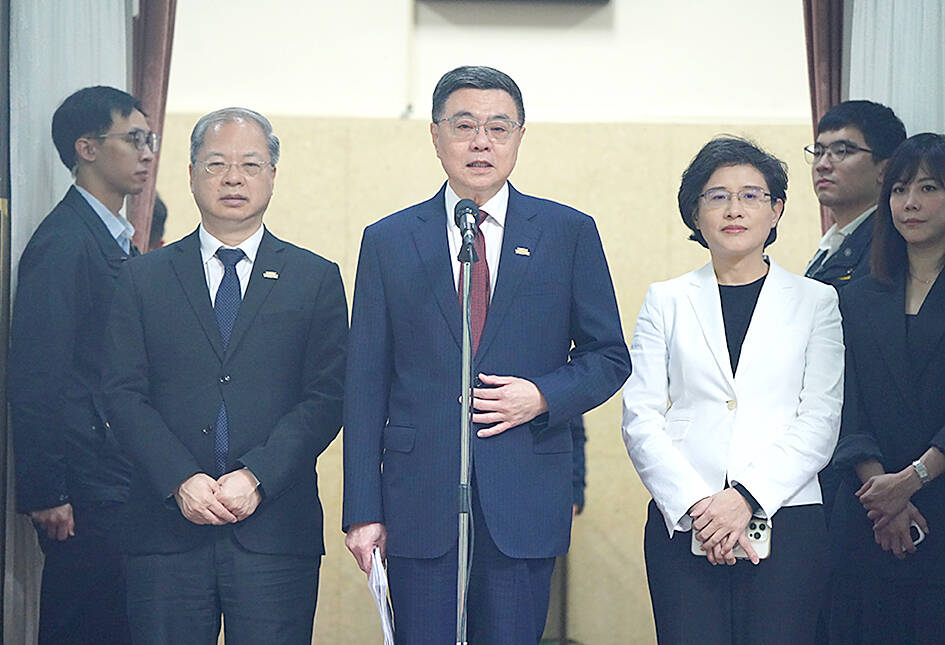The government would ensure that the most advanced chipmaking technology stays in Taiwan while assisting Taiwan Semiconductor Manufacturing Co (TSMC, 台積電) in investing overseas, the Presidential Office said yesterday.
The statement follows a joint announcement by the world’s largest contract chipmaker and US President Donald Trump on Monday that TSMC would invest an additional US$100 billion over the next four years to expand its semiconductor manufacturing operations in the US, which would include construction of three new chip fabrication plants, two advanced packaging facilities, and a research and development center.
The government knew about the deal in advance and would assist, Presidential Office spokesperson Karen Kuo (郭雅慧) said yesterday.

Photo: Bloomberg
Citing the Industrial Innovation Act (產業創新條例), Kuo said Taiwanese companies must obtain approval from the central government for foreign investments exceeding NT$1.5 billion (US$45.57 million).
TSMC’s application to invest in the US is no exception, she said.
The government is drafting a plan to forge resilient and diversified semiconductor supply chains with the US and other partners, she added.

Photo courtesy of the Presidential Office
Taiwan’s policy continues to be focused on making chips for the growing artificial intelligence industry in democratic nations, she said, adding that international cooperation is the future trend of the semiconductor industry.
Premier Cho Jung-tai (卓榮泰) said that TSMC’s new investment pledge in the US would help Taiwan’s industrial sector extend its global reach and make the country stronger.
The government views TSMC’s expanded investment in the US positively, as it would boost Taiwan’s competitive edge in the global market, and “making Taiwan stronger is the common stance of the government and industry,” Cho said.

Photo: CNA
The government has encouraged domestic industries to expand worldwide and will provide any necessary assistance for expansion, he said.
“I hope TSMC’s investments will continue to create mutual benefits and a win-win situation with Taiwan’s allies,” Cho said, adding that while encouraging overseas investments, “Taiwan is determined to maintain its lead over its peers in critical technologies.”
TSMC said in a statement yesterday that the new expansion plan would “play a crucial role in strengthening the US semiconductor ecosystem by increasing American production of advanced semiconductor technology.”
The US investment plan would not affect its expansion plans in other places, such as Taiwan and Japan, nor would it affect the company’s stable cash dividend policy, it added.
Monday’s announcement comes as Taiwan faced threats by Trump to impose tariffs on semiconductors.
Trump said that by bringing an extra US$100 billion in investment to the US, TSMC could “avoid paying tariffs.”
TSMC is already investing US$65 billion in Arizona to build three advanced wafer fabs.
The first fab in Arizona has started production using the 4-nanometer process, while the second fab, which is to deploy more advanced 3-nanometer, 2-nanometer and A16 processes, is under construction and is expected to begin production in 2028.
The third fab, of which TSMC has said little to date, is expected to begin production by 2030, TSMC said in April last year.
American Institute in Taiwan (AIT) Director Raymond Greene yesterday said in Taipei that the announcement made at the White House “showcases the deep connections between two of the world’s greatest technological and economic powerhouses.”
“The United States and Taiwan are mutually complementary economies that benefit greatly from investments in both directions, especially in the semiconductor sector,” Greene was quoted as saying on AIT’s Facebook page.
TSMC’s expanded investment “strengthens the economic prosperity and security of both the United States and Taiwan and will enable TSMC to better serve its largest customers in America,” he added.

A magnitude 5.6 earthquake struck off the coast of Yilan County at 12:37pm today, with clear shaking felt across much of northern Taiwan. There were no immediate reports of damage. The epicenter of the quake was 16.9km east-southeast of Yilan County Hall offshore at a depth of 66.8km, Central Weather Administration (CWA) data showed. The maximum intensity registered at a 4 in Yilan County’s Nanao Township (南澳) on Taiwan’s seven-tier scale. Other parts of Yilan, as well as certain areas of Hualien County, Taipei, New Taipei City, Taoyuan, Hsinchu County, Taichung and Miaoli County, recorded intensities of 3. Residents of Yilan County and Taipei received

Taiwan has secured another breakthrough in fruit exports, with jujubes, dragon fruit and lychees approved for shipment to the EU, the Ministry of Agriculture said yesterday. The Animal and Plant Health Inspection Agency on Thursday received formal notification of the approval from the EU, the ministry said, adding that the decision was expected to expand Taiwanese fruit producers’ access to high-end European markets. Taiwan exported 126 tonnes of lychees last year, valued at US$1.48 million, with Japan accounting for 102 tonnes. Other export destinations included New Zealand, Hong Kong, the US and Australia, ministry data showed. Jujube exports totaled 103 tonnes, valued at

BIG SPENDERS: Foreign investors bought the most Taiwan equities since 2005, signaling confidence that an AI boom would continue to benefit chipmakers Taiwan Semiconductor Manufacturing Co’s (TSMC, 台積電) market capitalization swelled to US$2 trillion for the first time following a 4.25 percent rally in its American depositary receipts (ADR) overnight, putting the world’s biggest contract chipmaker sixth on the list of the world’s biggest companies by market capitalization, just behind Amazon.com Inc. The site CompaniesMarketcap.com ranked TSMC ahead of Saudi Aramco and Meta Platforms Inc. The Taiwanese company’s ADRs on Tuesday surged to US$385.75 on the New York Stock Exchange, as strong demand for artificial intelligence (AI) applications led to chip supply constraints and boost revenue growth to record-breaking levels. Each TSMC ADR represents

TRUST: The KMT said it respected the US’ timing and considerations, and hoped it would continue to honor its commitments to helping Taiwan bolster its defenses and deterrence US President Donald Trump is delaying a multibillion-dollar arms sale to Taiwan to ensure his visit to Beijing is successful, a New York Times report said. The weapons sales package has stalled in the US Department of State, the report said, citing US officials it did not identify. The White House has told agencies not to push forward ahead of Trump’s meeting with Chinese President Xi Jinping (習近平), it said. The two last month held a phone call to discuss trade and geopolitical flashpoints ahead of the summit. Xi raised the Taiwan issue and urged the US to handle arms sales to